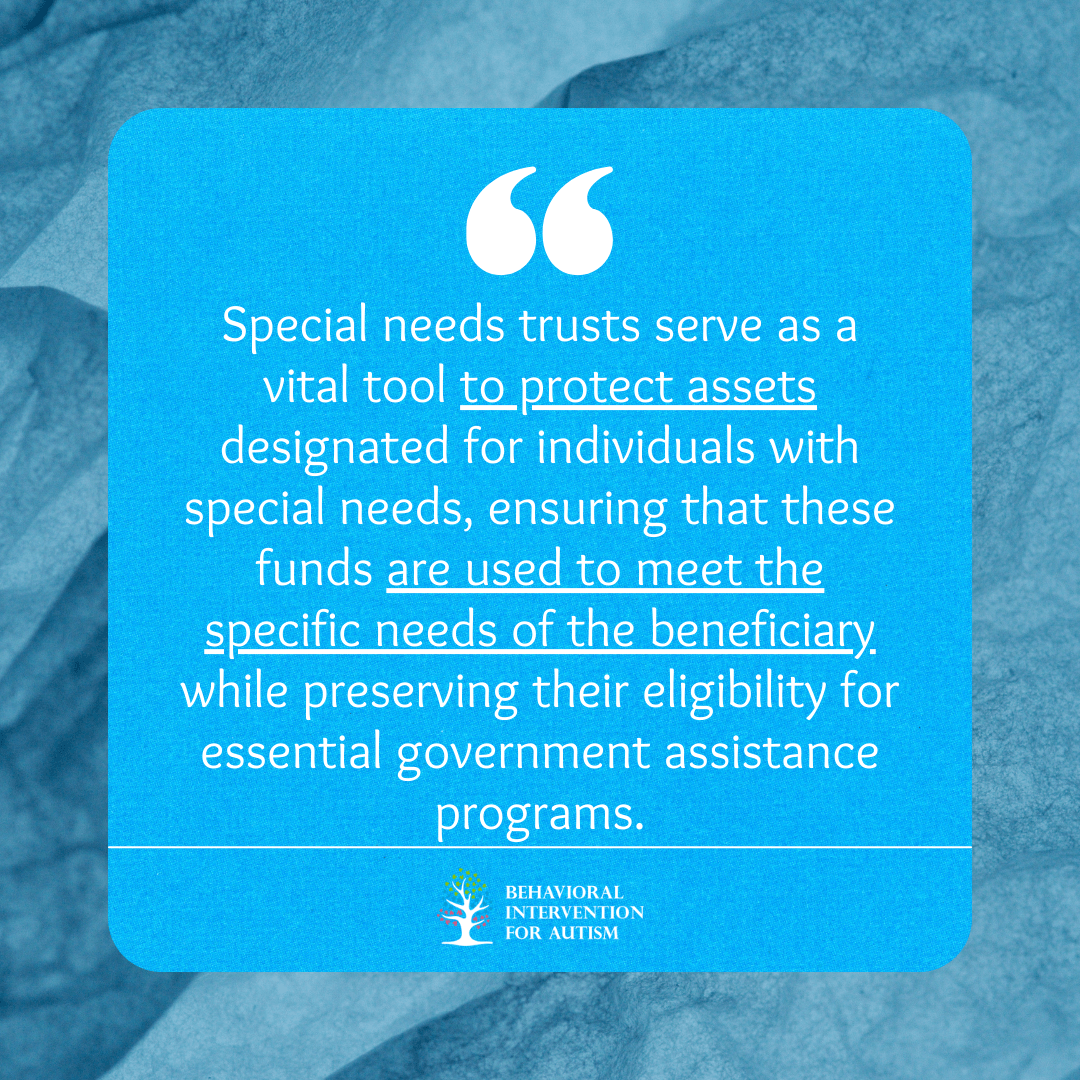
Table of Contents
Planning for the future financial well-being of a child with autism requires understanding special needs trusts (SNTs). These legal arrangements protect eligibility for public benefits while ensuring funds are available to meet the child’s needs.
Definition of Special Needs Trust
A special needs trust (SNT) is a specific type of trust established to benefit a child with autism. The primary purpose of an SNT is to protect the individual’s eligibility for public benefits by separating the assets placed in the trust from their direct ownership. By holding assets in the trust, individuals can maintain their qualification for essential services and support while still having access to necessary funds for various expenses related to their care.
Purpose of a Special Needs Trust
The overarching purpose of a special needs trust is to provide long-term financial security for individuals with disabilities or special needs, such as autism. By creating an SNT, parents and caregivers can ensure that their loved one has access to necessary resources beyond what public benefits may provide. This includes funding for medical care, therapies, education, housing, transportation, and other support services that enhance the quality of life for the individual with autism.

Understanding the definition and purpose of a special needs trust allows parents and caregivers to proactively secure their child’s financial future, ensuring lifelong care and support for their child with autism.
Funding a Special Needs Trust
Funding a special needs trust (SNT) for individuals with autism requires careful consideration of asset limits and available funding sources to ensure long-term financial security. Asset limits, typically set under $2,000, are crucial for eligibility for essential benefits. Exceeding this limit can jeopardize access to vital services, so contributions or gifts should be carefully managed.
Financial planners often recommend survivorship life insurance or second-to-die policies as effective funding sources for a special needs trust. These affordable options ensure that funds are available after the death of the second insured, providing continued support when caregivers are no longer around.
Special needs trusts are discretionary, meaning the trustee controls the trust assets, protecting them while meeting the beneficiary’s needs. By understanding asset limits and selecting appropriate funding options, caregivers can secure a financial plan that supports the well-being and access to services for individuals with autism.
Types of Special Needs Trusts
When it comes to planning for the future financial security of a loved one with special needs, understanding the different types of Special Needs Trusts (SNTs) is essential. Each type of trust serves a specific function tailored to the individual’s unique needs.

Different SNTs and Their Functions
Special Needs Trusts are specifically designed to protect assets for individuals with disabilities or special needs, ensuring that they can maintain their eligibility for essential government benefits and services. Here are some common types of SNTs and their functions:
Type of SNT | Function |
First-Party SNT | Established using the assets belonging to the individual with special needs, often used in cases where the individual receives a significant inheritance or legal settlement. |
Third-Party SNT | Created with assets from family members or loved ones, providing a means to support the individual with special needs without impacting their eligibility for government benefits. |
Pooled SNT | Pooled resources from multiple beneficiaries with special needs, managed by a nonprofit organization, offering cost-effective trust administration and investment management. |
Testamentary SNT | Established by a will or a trust to take effect after the death of the grantor, ensuring that the inheritance is managed for the benefit of the individual with special needs. |
Understanding the different types of Special Needs Trusts (SNTs) helps parents and caregivers make informed decisions for the long-term financial security of their loved ones. Choosing the right SNT is crucial, as it protects assets while ensuring access to essential services and support for individuals with special needs.
SNTs are discretionary, meaning the trustee has full control over how funds are used to benefit the beneficiary. Selecting a reliable trustee is essential, as they must make informed decisions that prioritize the well-being of the individual with special needs.
Carefully evaluating your child’s unique needs and consulting with a financial planner or attorney can help you establish the most suitable SNT, ensuring long-term financial stability and peace of mind for your family.
Setting Up a Special Needs Trust
Setting up a special needs trust (SNT) is a vital step in securing the financial future of a loved one with autism, ensuring long-term care and preserving eligibility for public benefits like SSI and Medicaid. Without an SNT, assets may disqualify the individual from essential government assistance.
Establishing an SNT alongside a will guarantees that individuals with autism have the necessary resources when their caregivers can no longer provide direct support. These trusts help protect assets while allowing beneficiaries to remain eligible for critical programs.
It’s also important to understand the tax implications of special needs trusts. Taxes related to income, capital gains, and other factors must be managed carefully to ensure compliance and maximize available resources. Consulting financial advisors and tax professionals ensures the trust is properly administered and provides lasting financial security for the individual with autism.
Managing a Special Needs Trust
The trustee of a Special Needs Trust (SNT) plays a vital role in managing and distributing trust assets for a child with autism. While legal or financial expertise is not required, qualities such as trustworthiness, involvement in the child’s life, and the ability to make difficult decisions are essential. The trustee has discretionary power to make financial decisions in the child’s best interest, ensuring the funds are used appropriately without the beneficiary controlling the assets.
Choosing the right trustee is crucial for the SNT’s success. Trusted family members, close friends, or professional trustees such as banks or trust companies can serve in this role. While family members may offer a personal connection, professional trustees bring expertise, though at an added cost. The trustee’s duties include managing assets, making investments, paying bills, and ensuring compliance with regulations, while maintaining communication with the beneficiary and caregivers.
It is important to periodically reassess the trustee to ensure they are still the best choice for the child’s evolving needs. This ongoing evaluation helps maintain financial stability, ensures effective management, and provides peace of mind for the family.
Ensuring Long-Term Financial Security
To safeguard the financial future of a child with autism through a Special Needs Trust (SNT), two key measures are essential: periodic reevaluation of trustee selection and the use of life insurance for funding.
Trustee selection should be revisited regularly to ensure the right person or institution is managing the trust as circumstances change. This process helps ensure that the trust remains in capable hands, optimizing the financial support for the child.
Life insurance, particularly second-to-die policies, offers an effective way to fund the SNT. These policies pay out after both parents pass away, providing a cost-effective means to ensure long-term financial stability for the child, securing their well-being after the parents are no longer present.

Learn How We Can Help Your Loved One
A special needs trust for individuals with autism is an essential tool to help families secure the financial future of their loved ones. By establishing a trust, you ensure that individuals with autism can receive necessary services without jeopardizing their eligibility for government benefits. Behavioral Intervention For Autism offers comprehensive ABA programs in Florida, designed to support individuals with autism at every stage of development. Our team is dedicated to providing personalized care through proven methods that help improve communication, behavior, and overall quality of life. If you want to explore how we can assist in creating a supportive environment for your family, don’t hesitate to contact us today.
- 9 Common Obsessions of Children With Autism You Should Know - February 25, 2025
- What is Neurodiversity? A Guide to Embracing Differences - February 25, 2025
- Understanding Hyperfocus in Autism: What It Means and Why It Happens - February 25, 2025
